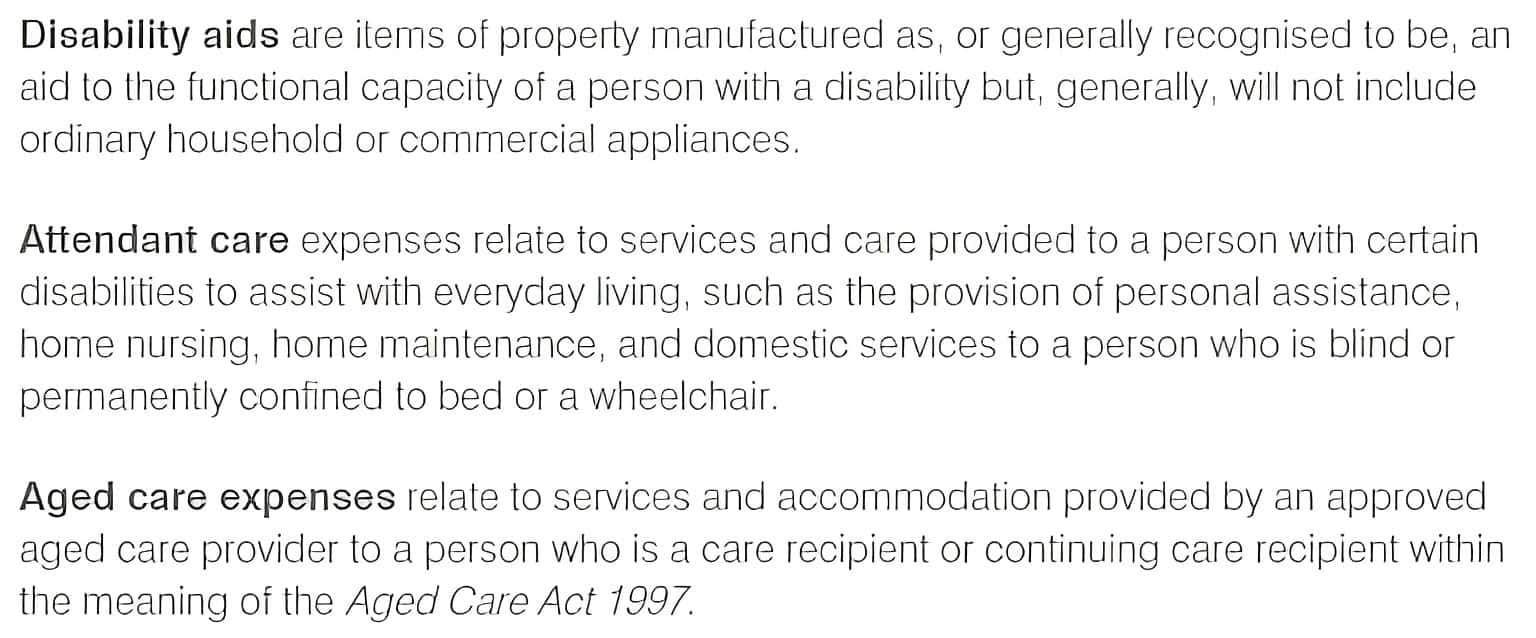Phase-out of medical expenses claims
Legislation passed in 2014 abolishes this offset from 1 July 2019.
From 2015-16 (until 2018-19) transitional arrangements only allow claims for disability aids, attendant care or aged care expenses.

Until 2014-15 allowable medical expenses must relate to an illness or operation paid to legally qualified doctors, nurses or chemists and public or private hospitals.
In general, expenses for cosmetic operations are excluded. Cosmetic operations are those for a Medicare benefit is not payable, or
dental services which are solely cosmetic.
Medical expenses paid while travelling overseas are included.
Medical expenses include payments:
- to dentists, orthodontists, or registered dental mechanics
- to opticians or optometrists, including for the cost of prescription spectacles or contact lenses
- to a carer who looks after a person who is blind or permanently confined to a bed or wheelchair
- for therapeutic treatment under the direction of a doctor
- for medical aids prescribed by a doctor
- for artificial limbs or eyes and hearing aids
- for maintaining a properly trained dog for guiding or assisting people with a disability (but not for social therapy)
- for laser eye surgery, and
- for treatment under an in-vitro fertilisation program.
to nursing homes or hostels (not retirement homes) if
- made to an approved care provider
-
for an approved care recipient’s permanent or respite care
-
for personal or nursing care, not just for accommodation. ( see ‘Residential aged care expenses’ notes below*)
Medical expenses not allowable:
- Expenses which do not qualify for the tax offset include payments made for:
- cosmetic operations for which a Medicare benefit is not payable
- dental services or treatments that are solely cosmetic
- therapeutic treatment where the patient is not formally referred by a doctor (a mere suggestion or recommendation by a doctor to the patient is not enough for the treatment to qualify; the patient must be referred to a particular person for specific treatment)
- chemist-type items, such as tablets for pain relief, purchased in retail outlets or health food stores
- inoculations for overseas travel
- non-prescribed vitamins or health foods
- travel or accommodation expenses associated with medical treatment
- contributions to a private health insurer
- purchases from a chemist that are not related to an illness or operation
- life insurance medical examinations
- ambulance charges and subscriptions
- funeral expenses
* Residential aged care expenses – further notes
An approved care recipient’s residential aged care payments usually include an amount for personal or nursing care if the recipient has an aged care assessment team (ACAT) assessment that they require either low- or high-level care.
Residential aged care payments can be for:
- daily fees
- income tested daily fees
- extra service fees, and
- accommodation charges, periodic payments of accommodation bonds or amounts drawn from accommodation bonds paid as a lump sum.
The following are expenses which cannot be included:
- lump sum payments of accommodation bonds
- interest derived by care providers from the investment of accommodation bonds (because these are not payments for residential aged care)
- payments for people who were residents of a hostel before 1 October 1997 and who did not have a personal care subsidy or a respite care subsidy paid on their behalf at the personal care subsidy rate by the Commonwealth (unless they have subsequently been reassessed as requiring care at levels 1 to 7 or received an ACAT assessment showing that they require either low or high level care)
- payments for people who have either been assessed as requiring level 8 care or who have not received an ACAT assessment showing that they require either low or high level care.
This page was last modified 2019-06-21